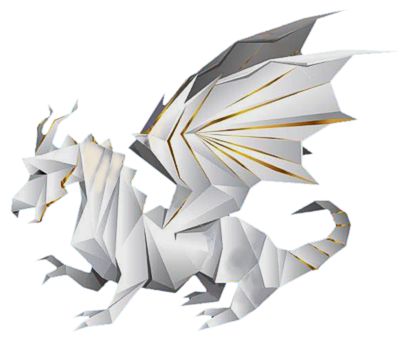

Dragon #156

| Climate/Terrain: | Any place with magical scrolls, books, etc. |
|---|---|
| Frequency: | Very rare |
| Organization: | Solitary |
| Activity Cycle: | Any |
| Diet: | Any paper with magical writings |
| Intelligence: | Very-high (11-14) |
| Treasure: | T |
| Alignment: | Chaotic good |
| No. Appearing: | 1 |
| Armor Class: | 6 (2 in flight) |
| Movement: | 6, Fly 24 (B) |
| Hit Dice: | 2+2 |
| THAC0: | 19 |
| No. of Attacks: | 4 (claw/claw/bite/tail sting) |
| Damage/Attack: | 1-2/1-2/1-4/1-3 |
| Special Attacks: | Poisonous sting, possible spell use |
| Special Defenses: | Camouflage |
| Magic Resistance: | Nil |
| Size: | T (6” long) |
| Morale: | Steady (12) |
| XP Value: | 650 |
Legend holds that this almost twodimensional creature was created to resemble, or possibly is, a true dragon. The wizard responsible for its creation was a bit eccentric (obviously) and had set out to make a guardian for his library of spells. After creating the paper dragon and finding out how well the creature worked, he channeled more magical energy into making it a living thing, able to exist anywhere and to breed, therefore causing a new race of dragons to come forth. But in the process of accomplishing this, something went wrong, and the paper dragon’s purpose was altered. Instead of protecting scrolls, it now considered them a food source. By the time the wizard found this out, the dragon had gone – and left him an empty library.
A paper dragon appears to be a very small dragon made of some expensive parchment, upon which decorations appear like handwriting or illustrations.
Due to its two-dimensional appearance and coloration, it has a 50% chance of being mistaken in low torchlight for merely a drawing of a dragon. Closer inspection or better lighting reveals its true nature.
Combat: The paper dragon attacks by two methods. The first method is a physical attack with two claws, a bite, and a tail sting. The tail stinger injects poison that causes sleep for two turns. If a save vs. poison is made, the effect is drowsiness that also lasts for two turns. While drowsy, the character cannot engage in any activity that requires fast movement or dexterity (climbing, picking locks, dodging missiles, etc.), and he suffers a -3 penalty on to-hit and damage rolls (minimum of 1 hp damage).
The paper dragon’s second mode of attack is the hurling of its most recently eaten spell. When encountered, a paper dragon has 1-4 magical scrolls in its lair that it is saving for food. Generate each scroll using Table 90 in the AD&D; 2nd Edition Dungeon Master’s Guide (pages 135-136), then generate one extra scroll to represent the last meal that the paper dragon has eaten. Randomly generate one spell from that eaten scroll, and that will be the spell the paper dragon is able to cast at the adventurers. If the scroll was a protection scroll, the dragon can create that protective effect; if the scroll was cursed, the dragon has no effective spell attack. The paper dragon casts its spell or effect by appearing to burp in the direction of its victims. If hard pressed, a paper dragon may hurriedly gulp down part or all of a scroll; it is able to eat one spell from a scroll without disturbing other spells, and it can read magic to determine which spell will be the most advantageous. The consumption of part or all of a scroll takes one round.
Habitat/Society: The paper dragon can be found in scrolls, spell books, or almost any sort of magical writings. It derives nourishment from the magical inks used in such writings.
Ecology: Paper dragons are good natured but destructive. How they manage to reproduce is a complete mystery. If slain, a paper dragon may be unfolded like an origami figure; if the unfolder passes a dexterity check on 1d20 (to keep from tearing the paper) and if the paper dragon was not damaged in any way by its cause of death, the dragon unfolds into a 1’-square sheet of paper upon which the contents of the last scroll it has eaten are written down.
by Kay I. Lilley
